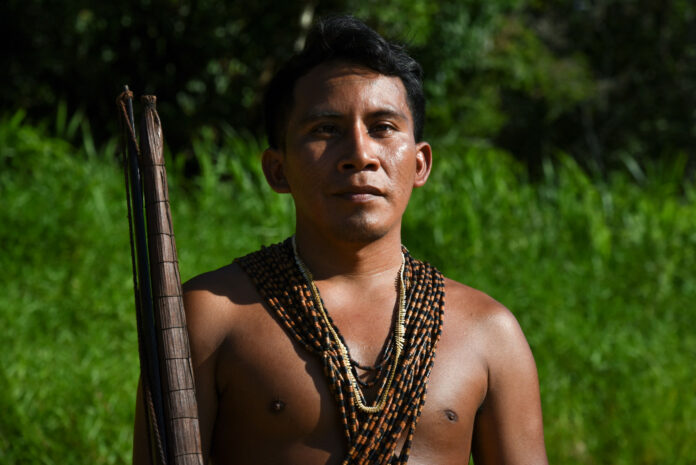The lungs of a planet—the Amazon rainforest—continue to be ravaged by climate change and is in need of help more than ever. Yet, an alarming trend of assassinations of Earth defenders puts the Amazon and the world at risk.
I live amid those lungs and have witnessed their slow destruction. Colombia now ranks second in the number of environmental defenders murdered for trying to safeguard the planet.
According to the 2022 Global Analysis report from the Ireland-based international human rights organization Front Line Defenders, Colombia topped the list of deadliest countries for social or environmental activists, with over 186 reported murdered last year, accounting for 46 percent of the global count. Indigenous rights activists made up 88 of those victims—some were children, who have so often borne the brunt of Colombia’s ongoing internal conflict.
Amazonians, who protect these lands, hail from 64 different Indigenous communities, four of which have no contact with the outside world. For more than six decades, Indigenous peoples and other ethnic groups, including Afro-Colombian descendants, have been embroiled in a cruel war waged by legal and illegal armed actors.
Systemic racism and geography have made our communities especially vulnerable.
Indigenous communities often reside in remote areas that are seen as advantageous to guerilla warfare, illegal mining, cattle ranching, and drug cultivation. Coastal areas act as trafficking sites for illegal arms and drugs. This has made it incredibly hard for our communities to farm, fish, and go about our daily lives without getting caught in the crossfire, forcing us to hide, relocate, or seek ways to defend ourselves. But when we try to stand up, we are threatened or killed.
As a person of Amazonian descent, I believe that only through the total cessation of our country’s internal conflicts can climate change be mitigated. Tackling the very real threat posed by climate change means going down the path of “total peace,” a term Colombian President Gustavo Petro adopted as the title of his comprehensive new policy to reinforce the country’s historic 2016 peace agreement.
The Ethnic Chapter of the 2016 Peace Agreement
Some strides have been made to include us in Colombia’s 2016 peace agreement between the Colombian government and the now-demobilized rebel group Revolutionary Armed Forces of Colombia (FARC-EP). The most significant being the formation of the Ethnic Chapter—creating an independent Special High-Level Forum with Ethnic Peoples (IEANPE) and a Special Women’s Forum for Gender Perspective on the Peace.
LINA VANEGAS/AFP via Getty Images
These forums were supposed to monitor and promote the peace agreement’s six main points: comprehensive rural reform, political participation, an end to the conflict, a solution to the illicit drugs problem, an agreement on victims of the conflict, and implementation, verification, and endorsement. And yet, little progress has been made in responding to our requests and recommendations while illicit activity has continued to destroy Amazon and its protectors.
Very few families have been granted land titles, illicit drug production and trafficking are rampant, and those that threaten and kill in our communities enjoy great impunity.
Further, the rapid pace of deforestation has put our people in constant threat of extinction, and in turn, poses a threat to all of humanity. The Institute of Hydrology, Meteorology, and Environmental Studies (IDEAM) estimated that 70 percent of the country’s deforestation took place in Amazonia, accounting for a loss of 270,091 acres of forest.
Article 22 of Colombia’s constitution states that peace is not only a right; it’s a duty—the greatest mandate of the Colombian people. But despite this legal framework, Colombia has systematically violated human rights and normalized crimes against humanity, forced disappearances, extrajudicial executions, massacres, displacements, coercive or forced recruitments into armed groups, and sexual violence by illegal armed actors.
That’s why we must support President Petro’s Total Peace policy, which aims to double down on the implementation of the 2016 Final Agreement for the Termination of the Conflict and the Construction of a Stable and Lasting Peace. To achieve that, we need to connect the efforts of the past to those going on today. This means embracing all of society, including Indigenous and Black peoples, peasants, students, women, youth, union members, businesspeople, artists, and more.
To move toward total peace, it is essential that our society and leaders pay close attention to what is happening in our territory and the ways in which the actions and omissions of the state contributed to the continuation of armed conflicts.
International Support
It will take more than just Colombians to preserve the lungs of our planet. The international community, and especially the United States, must show support for the Petro administration’s active re-engagement on the historic 2016 peace accords.
To protect the Amazon, international allies must support the implementation of the peace deal and Petro’s subsequent Total Peace policy. This includes efforts to demobilize remaining armed groups, promote the development of a regionally responsive economy, undertake peace-oriented education programs, life-giving health services, and reparations- and a reconciliation-centered justice system.
Total peace must reach every corner of Colombia, flowing through the rivers, roads, and trails of the most remote parts of the country. And it must center on those most affected by the armed conflict.
Fany Kuiru Castro is a leader of the Uitoto Indigenous community in the Colombian Amazon. She has been involved with the Indigenous people’s movement since her youth, fighting to raise awareness of the human rights violations related to rubber tapping in her region. She is a lawyer from Santo Tomas University and a public administration specialist with a master’s degree in political and international studies.
The views expressed in this article are the writer’s own.


